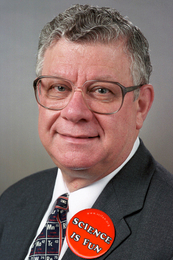
ENLIGHTENMENT AND THE RESPONSIBILITIES OF THE ENLIGHTENED IN COMMUNICATING CHEMISTRY

Keynote address by Professor Bassam Shakhashiri
Thursday May 17th, 6:00 PM
Abstract: Chemistry is both the central science and the familiar science. The familiarity of chemistry has yet to be fully exploited in reaching all segments of society, especially the nonspecialists. Chemistry brings a wide range of goods and functions to everyone and thus is vital to our democracy.
Science literacy is necessary for the democratic process to work. I make a distinction between scientific literacy, expertise in a particular field, and science literacy, a broad appreciation and understanding of science and its practitioners, and of what science is capable of achieving and what it cannot accomplish. Science literacy enlightens and enables people to make informed choices; to be skeptical; to reject shams, quackery, and unproven conjecture; and to avoid being bamboozled into making foolish decisions where matters of science and technology are concerned. Science literacy is for everyone -- chemists, artists, humanists, all professionals, the general public, youth and adults alike. All practitioners of chemistry must work effectively to achieve science literacy by increasing awareness of chemicals, their transformations, hazards, and how they benefit everyone's health, safety, and environment. We must improve and expand our role in communicating the value of science and technology to students, parents, community leaders, the public at large, and to decision makers in government and the private sector. We must showcase the best of chemistry as it addresses significant human and societal issues. My presentation will include demonstrations to show how science can be communicated to all segments of our society. Students, faculty, and all members of the community are invited. Come learn about combustion, exploding balloons, liquids that glow in the dark, polymers, and other spectacular scientific phenomena. You will sit at the edge of your seat and will see science in action.
Web Page: www.scifun.org

Dr. Shakhashiri's Bio: Bassam Z. Shakhashiri is professor of chemistry at the University of Wisconsin-Madison and the first holder of the William T. Evjue Distinguished Chair for the Wisconsin Idea. He is well known internationally for his effective leadership in promoting excellence in science education at all levels and for his development and use of demonstrations in the teaching of chemistry in classrooms as well as in less formal settings such as museums, convention centers, shopping malls and retirement homes. The Encyclopedia Britannica cites him as the "dean of lecture demonstrators in America." His scholarly publications, including the multi-volume series, Chemical Demonstrations A Handbook for Teachers of Chemistry, are models of learning and instruction that have been translated into several languages.
Professor Shakhashiri has given over1100 invited lectures and presentations in the North America, Europe, Asia, Australia, the Middle East, and South America. He is probably best known to the public at large in the USA for his annual program, "Once upon a Christmas Cheery in the Lab of Shakhashiri," which has been seen on PBS and on cable television stations throughout the country. This science-oriented entertainment has played to packed houses at such varied locations as the University of Wisconsin-Madison, the National Academy of Sciences and the Smithsonian's National Air and Space Museum in Washington, and the halls of the U.S. Congress. Professor Shakhashiri has been featured in newspapers, magazines, national and local radio and television, including the New York Times, the Washington Post, Newsweek, Time, the German-language Business Week, NBC Nightly News, National Public Radio, CNN, and the Larry King Show. He appears as a regular guest on the Ideas Network of Wisconsin Public Radio and on WKOW-TV's WAKE UP WISCONSIN.
In 1977, Professor Shakhashiri was the founding chair of the University of Wisconsin System Undergraduate Teaching Improvement Council. In 1983 he founded the Institute for Chemical Education (ICE) and served as its first director. His work with ICE inspired the establishment of the Center for Biology Education, the Merck Institute for Science Education, the Miami University (of Ohio) Center for Chemical Education, among others.
From 1984 to 1990 Professor Shakhashiri served as Assistant Director of the National Science Foundation for Science and Engineering Education. As the NSF chief education officer he presided over the rebuilding of all the NSF efforts in science and engineering education after they had been essentially eliminated in the early 1980's. His leadership and effectiveness in developing and implementing national programs in science and engineering education have helped set the annual NSF education budget at its current level of almost $800 million. His NSF strategic plan launched the systemic initiatives and most of the other NSF education programs of the last two decades.
Professor Shakhashiri is a consultant to government agencies, industry, and private foundations on matters related to education at all levels.
Professor Shakhashiri currently directs the Initiative for Science Literacy and its various programs including Science in the City, SCIENCE IS FUN! public presentations, the SCIENCE IS FUN web site www.scifun.org, Science, the Arts, and the Humanities, Women in Science, and the Conversations in Science Series.
Professor Shakhashiri is the recipient of over 35 awards, including the 2002 American Association for the Advancement of Science Award for Public Understanding of Science and Technology. In 2004 he was inducted into the Hall of Fame of the national chemistry fraternity Alpha Chi Sigma. In 2005 he received the Madison Metropolitan School District "Distinguished Service Award for Citizen", was elected Fellow of the Wisconsin Academy of Sciences, Arts and Letters, received the CHEMICAL PIONEER Award from the American Institute of Chemists, the American Chemical Society Helen M. Free Award for Public Outreach for "lifelong accomplishments and for explaining and demonstrating science with charisma and passion", and was cited in the Answer Book of Capital Newspapers as "the coolest UW professor." He is the recipient of five honorary doctoral degrees.